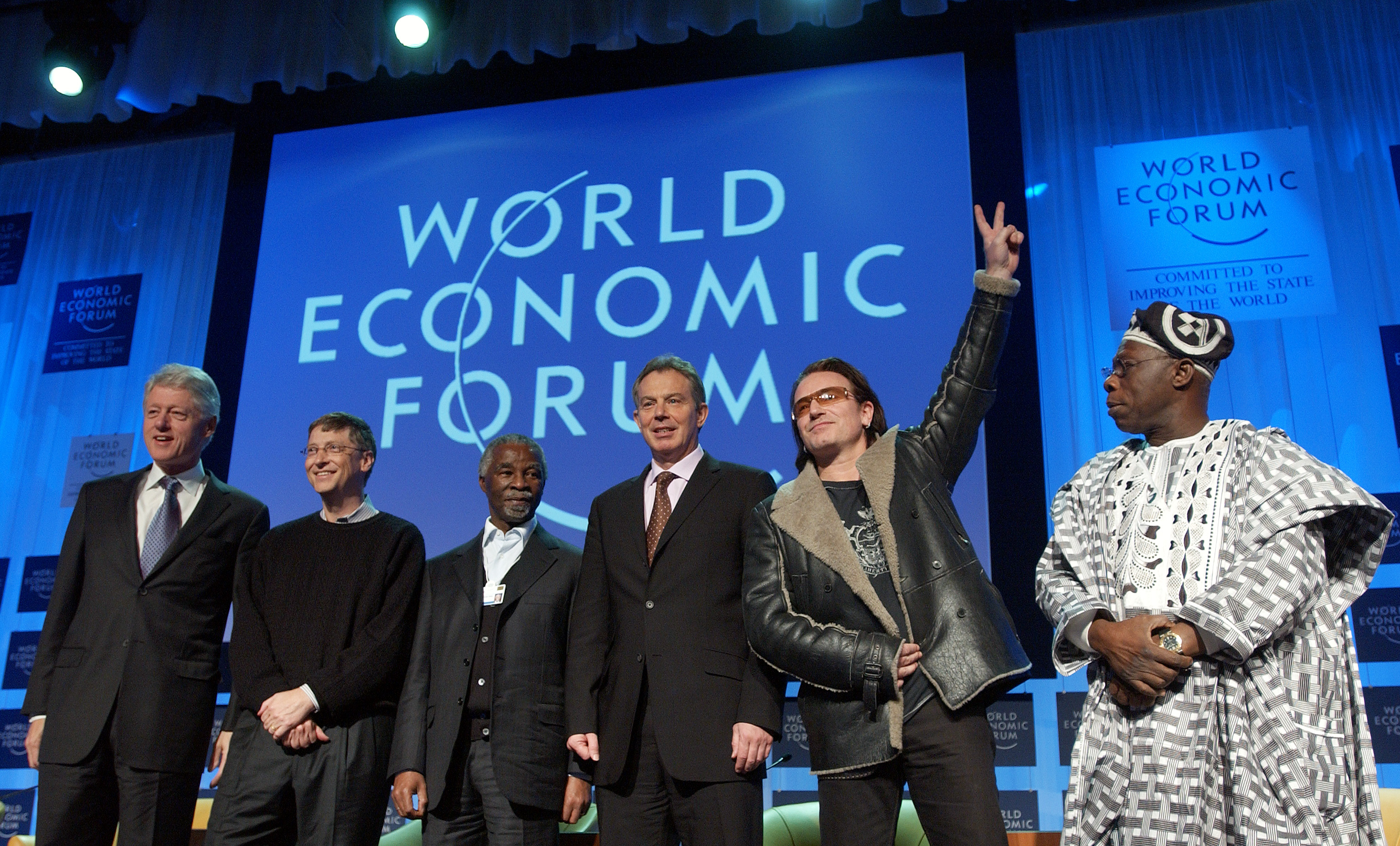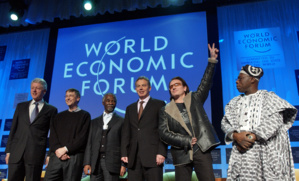Here are four key issues that will be discussed in Davos.
1. Automation
The conference theme this year - "The Fourth Industrial Revolution." This refers to technologies that lead to economic changes. This name was taken from the book of the founder and president of the World Economic Forum Klaus Schwab.
Technological innovations are already changing the world economy structure.
Taxi drivers and laborers use platforms like Uber and TaskRabbit without having the privilege, traditionally provided the employees working at the company, such as health insurance or unemployment benefits.
More and more people can get out of the labor force with increasing mass of automation. Google searches for partners in the automotive industry to work together on an unmanned vehicle, and Toyota plans that its own unmanned model will ride the roads by 2020.
Economists try to predict which workers are most likely to leave the labor market and how it will affect level of income and gender equality.
Benedikt Carl Frey and Michael Osborne at Oxford University believe that about 45% of US jobs can be automated.
If we consider the matter more broadly, growth of automation can increase equipment performance, so manufacturing the same or even larger volume of production will require less investment in the long term.
Although it seems a positive effect, it can lead to a prolonged slowdown of economic growth in rich economies - a phenomenon called long-term stagnation.
In addition, a canary in the gold mine can the fact that wealthier households will continue to accumulate savings, and investors will invest much less, as a smaller amount of capital would generate more revenue with the increase in automation.
This can lead to excessive savings, which in turn will reduce size of economies.
2. China
In the first decade of the XXI century, China's economic growth reached 10%, yet the rate of growth is now starting to decline. Moreover, everyone has a strong feeling that China is dragging the rest of the emerging markets on declining trajectory.
Despite the fact that the World Bank forecasts growth of 7% for this year is credible, the current situation will anyhow negatively affect the domestic labor force, as well business and investors who are betting on higher growth rates.
In the past six months, foreign investors were not in the most favorable situation due to exchange rate fluctuations and stock market crash. Even Beijing’s statements have failed to reassure investors.
Davos will be a good chance for this country to rehabilitate itself in the eyes of investors, providing a decent explanation and instruction.
3. Emerging markets
Growth rates in emerging markets have been slowed due to a variety of events that occurred during 2015. Many predict that this trend will continue in the new year.
As China's demand for raw materials, used for its heavy industry and construction, begins to decline, raw material prices have fallen to 10-year low. India, which, in contrast to most other developing economies, is not a net exporter of raw materials, was able to avoid the negative consequences.
In addition, the Fed has raised rates at the end of 2015, which in turn resulted in growing dollar.
International financial markets have already anticipated such a development.
A stronger dollar means a problem for emerging economies that have a substantial amount of debt denominated in US dollars on the background of lower revenues from raw materials sale.
For example, Standard & Poor and Fitch Ratings have lowered Brazil’s credit rating to "junk" status.
4. The UK’s potential escape from the EU
UK plans to hold a referendum on whether or not to remain the EU’s member. Therefore, there is a high level of uncertainty about what consequences the exit will bring to the UK economy.
Despite this, majority of economists polled by Financial Times believe that the UK’s escape from the EU is unlikely to seriously hurt the country’s economy in the medium term.
Claimed reasons for the referendum was the concern about immigration control and control from Brussels.
The Conservative Party promised to reduce migration to "tens of thousands", but critics say it is impossible, given the "freedom of the borders" within the EU.
World in Davos
Some analysts believe that the Davos forum is becoming an obsolete and less influential platform.
However, there are still world leaders and influential members of the business community coming in there. This year, the event welcomes British Prime Minister David Cameron, President of Ukraine Petro Poroshenko, Prime Minister of Greece Alexis Tsipras, Head of the Turkish government Ahmet Davutoglu, Prime Minister Benjamin Netanyahu, presidents and prime ministers of Mexico, Afghanistan, South Africa, Colombia, Kazakhstan, Azerbaijan, Iraq, Canada and other countries.
The financial world, in addition to the leaders of the world's largest companies and banks, is presented by Head of the IMF Christine Lagarde, and the chairman of the European Central Bank Mario Draghi. Top managers of IT-giants like Facebook, Alibaba Group, Airbnb, Baidu.com, Cisco, Dell, Hewlett Packard, Google will be responsible for the main topic ("The Fourth Industrial Revolution").
1. Automation
The conference theme this year - "The Fourth Industrial Revolution." This refers to technologies that lead to economic changes. This name was taken from the book of the founder and president of the World Economic Forum Klaus Schwab.
Technological innovations are already changing the world economy structure.
Taxi drivers and laborers use platforms like Uber and TaskRabbit without having the privilege, traditionally provided the employees working at the company, such as health insurance or unemployment benefits.
More and more people can get out of the labor force with increasing mass of automation. Google searches for partners in the automotive industry to work together on an unmanned vehicle, and Toyota plans that its own unmanned model will ride the roads by 2020.
Economists try to predict which workers are most likely to leave the labor market and how it will affect level of income and gender equality.
Benedikt Carl Frey and Michael Osborne at Oxford University believe that about 45% of US jobs can be automated.
If we consider the matter more broadly, growth of automation can increase equipment performance, so manufacturing the same or even larger volume of production will require less investment in the long term.
Although it seems a positive effect, it can lead to a prolonged slowdown of economic growth in rich economies - a phenomenon called long-term stagnation.
In addition, a canary in the gold mine can the fact that wealthier households will continue to accumulate savings, and investors will invest much less, as a smaller amount of capital would generate more revenue with the increase in automation.
This can lead to excessive savings, which in turn will reduce size of economies.
2. China
In the first decade of the XXI century, China's economic growth reached 10%, yet the rate of growth is now starting to decline. Moreover, everyone has a strong feeling that China is dragging the rest of the emerging markets on declining trajectory.
Despite the fact that the World Bank forecasts growth of 7% for this year is credible, the current situation will anyhow negatively affect the domestic labor force, as well business and investors who are betting on higher growth rates.
In the past six months, foreign investors were not in the most favorable situation due to exchange rate fluctuations and stock market crash. Even Beijing’s statements have failed to reassure investors.
Davos will be a good chance for this country to rehabilitate itself in the eyes of investors, providing a decent explanation and instruction.
3. Emerging markets
Growth rates in emerging markets have been slowed due to a variety of events that occurred during 2015. Many predict that this trend will continue in the new year.
As China's demand for raw materials, used for its heavy industry and construction, begins to decline, raw material prices have fallen to 10-year low. India, which, in contrast to most other developing economies, is not a net exporter of raw materials, was able to avoid the negative consequences.
In addition, the Fed has raised rates at the end of 2015, which in turn resulted in growing dollar.
International financial markets have already anticipated such a development.
A stronger dollar means a problem for emerging economies that have a substantial amount of debt denominated in US dollars on the background of lower revenues from raw materials sale.
For example, Standard & Poor and Fitch Ratings have lowered Brazil’s credit rating to "junk" status.
4. The UK’s potential escape from the EU
UK plans to hold a referendum on whether or not to remain the EU’s member. Therefore, there is a high level of uncertainty about what consequences the exit will bring to the UK economy.
Despite this, majority of economists polled by Financial Times believe that the UK’s escape from the EU is unlikely to seriously hurt the country’s economy in the medium term.
Claimed reasons for the referendum was the concern about immigration control and control from Brussels.
The Conservative Party promised to reduce migration to "tens of thousands", but critics say it is impossible, given the "freedom of the borders" within the EU.
World in Davos
Some analysts believe that the Davos forum is becoming an obsolete and less influential platform.
However, there are still world leaders and influential members of the business community coming in there. This year, the event welcomes British Prime Minister David Cameron, President of Ukraine Petro Poroshenko, Prime Minister of Greece Alexis Tsipras, Head of the Turkish government Ahmet Davutoglu, Prime Minister Benjamin Netanyahu, presidents and prime ministers of Mexico, Afghanistan, South Africa, Colombia, Kazakhstan, Azerbaijan, Iraq, Canada and other countries.
The financial world, in addition to the leaders of the world's largest companies and banks, is presented by Head of the IMF Christine Lagarde, and the chairman of the European Central Bank Mario Draghi. Top managers of IT-giants like Facebook, Alibaba Group, Airbnb, Baidu.com, Cisco, Dell, Hewlett Packard, Google will be responsible for the main topic ("The Fourth Industrial Revolution").






